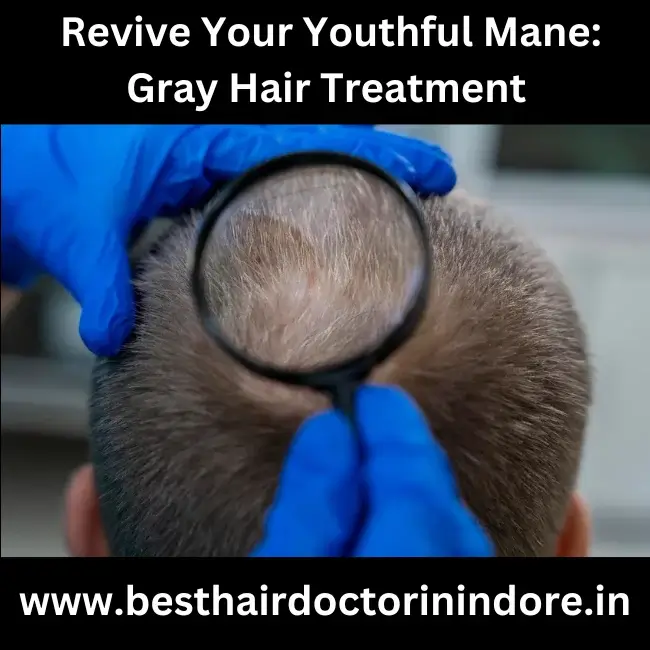Gray hair is a natural part of the aging process, and while many people embrace it as a symbol of wisdom and experience, some individuals may find it distressing. If you’re concerned about your gray hair and looking for effective treatment options, consulting a doctor can be a valuable step in your journey to maintain or regain your natural hair color. In this blog, we will explore various gray hair treatment options that a doctor can provide, helping you make an informed decision about the best approach for your unique situation.
Table of Contents
ToggleUnderstanding the Causes of Gray Hair
Before diving into treatment options, it’s essential to understand why our hair turns gray. Gray hair occurs when the melanocytes, the pigment-producing cells in hair follicles, gradually produce less melanin, the pigment responsible for hair color. Several factors contribute to this process, including genetics, age, and environmental factors such as stress and nutritional deficiencies.
Gray Hair Treatment Options by a Doctor
Nutritional Supplements: A doctor can assess your diet and recommend supplements that may help maintain or restore hair color. Certain vitamins and minerals, such as B vitamins, copper, and zinc, play a crucial role in hair pigmentation. Supplements may be recommended if you have deficiencies in these nutrients.
Topical Medications: Some topical treatments containing compounds like minoxidil and peptides have shown promise in slowing down the graying process and promoting the regeneration of pigment-producing cells. Your doctor can prescribe and monitor the use of these medications.
Hormone Therapy: Hormonal imbalances can contribute to premature graying. If this is the case, your doctor may recommend hormone therapy to rebalance your hormonal levels. This treatment is particularly effective for individuals experiencing gray hair due to thyroid disorders or other hormonal issues.
Anti-aging Procedures: For individuals looking for a more dramatic change, there are cosmetic procedures like laser therapy and platelet-rich plasma (PRP) therapy. These treatments can stimulate hair follicles and promote the growth of naturally colored hair.
Hair Dye: Although not a permanent solution, hair dye is a straightforward way to cover gray hair temporarily. Doctors can recommend safe and effective dye products or even perform professional coloring treatments in their offices.
Lifestyle Modifications: Your doctor may also recommend lifestyle changes to help prevent further graying. This could include managing stress, maintaining a balanced diet, and adopting a healthy hair care routine.
Consulting for Gray Hair Treatment
When considering gray hair treatment, it’s essential to consult a doctor rather than self-diagnosing or self-treating. A doctor can assess your overall health, identify any underlying medical conditions contributing to graying, and recommend personalized treatments based on your unique needs.
Here are some important steps to follow when consulting a doctor for gray hair treatment:
Schedule an Appointment: Book a consultation with a dermatologist or a healthcare professional who specializes in hair and scalp conditions.
Medical History: Be prepared to provide your medical history, including any family history of premature graying or related medical conditions.
Physical Examination: The doctor will conduct a physical examination of your scalp and hair to assess the extent of graying and check for any underlying issues.
Diagnostic Tests: In some cases, your doctor may recommend blood tests to check for nutrient deficiencies or hormonal imbalances.
Treatment Plan: Based on the evaluation and test results, your doctor will develop a personalized treatment plan that may include a combination of the treatment options mentioned above.
Follow-up Appointments: Regular follow-up appointments are crucial to monitor your progress and make any necessary adjustments to your treatment plan.
Conclusion
Gray hair is a natural part of aging, but if you’re concerned about it and want to explore treatment options, consulting a doctor is a wise choice. Whether you’re interested in nutritional supplements, topical medications, hormonal therapy, or cosmetic procedures, best doctor for gray hair treatment can guide you towards the most suitable and effective treatments for your specific needs. a personal choice, and with the right medical guidance, you can make an informed decision that aligns with your preferences and goals.


